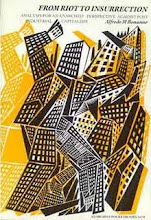First published in Insurrection Issue Four 1984
We must get out of the contradictions and ambiguities that anarchists find themselves in when considering the problem of the national liberation struggle. A proposal for an international anarchist confederation for national liberation.
One of the most disputed principles of the anarchist struggle is that of seeing the possibility for developing a revolutionary dimension within the national one.
This problem gives rise to much fear and incomprehension.
It is said that anarchism, being internationalist, should not concern itself with events related to situations within single nations. The clash between classes puts all the exploited at the same level against the exploiters, so one part cannot be extracted from the social war and restricted to within a single territory or nation.
Other dangers are listed with reference to specific historical situations: dangers of involution, of transforming the national liberation struggle into a florid new nationalism or of giving the local bourgeoisie preference over the foreign one. And many other arguments which to tell the truth are not always serene or well thought out.
Many comrades have not thought sufficiently about this thorny problem. They express judgments based on preconceived ideas, not on an evaluation of the limits or possibilities of a struggle for national liberation carried out by anarchists and laid out on anarchist principles.
As the idea of revolution breaking out all over the planet at the same time is unthinkable, it should not be impossible to envisage a breakout of revolutionary events in one specific place at a time. Now if this is reasonable enough one must admit then that a correct anarchist analysis applied to the main areas of tension would lead to the possibility of intervening in an organised and strategically clear way.
Certain situations exist in the world today that present contradictions of a predominantly national kind. Why is it that anarchists must stay outside them? Perhaps because recent experience has shown that these situations often have reactionary outcomes? Or because nearly all of them are dominated by marxist positions? These are not good enough reasons. One could reply to the first that there is no such situation as one that can guarantee a revolutionary or progressive outcome in advance, but rather that such an outcome would be more probable in the presence of anarchists and their struggle. To the second one could say that the re-lationship between marxism and the national liberation struggle is purely instrumental. That is, the people in struggle have adopted - especially in Africa and South America - certain marxist elements as they have nothing else at their disposition. And is this not perhaps the fault of the anarchists?
We are therefore for intervention in the various national liberation struggles: Not just a general one of solidarity or, worse still, that of systematically drawing political distinctions: We are for an active intervention.
By active intervention we mean not only "real" international solidarity consisting of attacking the common enemy; but also an intervention based on analysis and organisational proposals.
One of the proposals that seems right at the present time, and which could become a point of reference in the future, is that of forming an International Confederation for National liberation, accepting the distinguishing factor of the insurrectional method and the refusal of interclassism.
skip to main |
skip to sidebar

Some writings of Alfredo Maria Bonanno in English, or almost

Alfredo Bonanno was arrested on October 1st 2009 in Greece, accused of concourse in robbery. With him, anarchist comrade Christos Stratigopoulos.
Here are a few translations and part translations of a small portion of Alfredo's writing. This is a work in progress, many of the translations are as yet incomplete. Open links to find more of Alfredo's work.
Alfredo Bonnano Released
Nov. 22 Alfredo Bonnano was sentenced to 4 years imprisonment (which practically means that with the time served so far and the fact that he is over 70years old HE IS RELEASED
Christos Stratigopoulos (who took responsibility for the action)
was sentenced to 8 years and 9 months with the Greek law will probably be released at the end 2011
BY ANY MEANS NECESSARY
LINKS
click on any of these labels to read text
- "Community" sickness
- 1981 - Editorial
- A Critique of Syndicalist Methods
- A few notes on Sacco and Vanzetti
- A few notes on the revolutionary movement in Italy
- A little man in Singapore
- A million jobs
- A question of class
- Affinity
- After Marx autonomy
- Albania Laboratory of Subversion (Introduction)
- Anarchism and the national liberation struggle
- Anarchists and action
- AND WE WILL ALWAYS BE READY TO STORM THE HEAVENS AGAIN (Against amnesty)
- ANTI-INSTITUTIONAL MOVEMENT
- Are we modern?
- Armed Joy
- ARMED STRUGGLE. SOME REFLECTIONS.
- Autonomous base nuclei
- beyond syndicalism
- Beyond workerism
- But what is the imaginary?
- Class War
- Comiso - Organizational document of the self-managed leagues
- Considerations on illegality
- Dissonances (Introduction)
- Elephant Editions 1986
- Excluded and included
- Farewell to claiming
- Feral Revolution (Introduction)
- FICTITIOUS MOVEMENT AND REAL MOVEMENT
- For an Antiauthoritarian Insurrectionist International - Proposal for a debate
- From riot to insurrection
- From the centre to the periphery
- Good technology
- Guerilla Extraordinary
- Habits and idols
- Hegel
- I know who killed chief superintendent Luigi Calabresi
- Illegality
- Illness and capital
- Informal organisation
- Insurrection
- Internationalism
- Introduction to Sabate
- Introduction to Anarchism and Violence
- Introduction to Bratach Dubh English edition of Malatesta's Fra Contadini
- Introduction to Insurrectionalist Anarchism
- Introduction to Strange Victories
- Introduction to The Conquest of Bread
- Involuntary aspects of voluntary work
- Let's destroy work
- LET'S DESTROY WORK. New introduction
- Let's keep our feet on the ground please
- Lightening Conductors and Stand-ins - more shots of non-news
- Lightning Conductors and Stand-ins
- Lightning Conductors and Stand-ins (cont.)
- Locked up
- Looking forward to self-management
- Loss of language
- More on internationalism
- National Liberation Struggle
- nineteen years on
- No more crises
- Non-news about drugs
- Non-news about racism
- Ode to the Uniform
- On Feminism
- One's life on the line
- Order and chaos
- Otto Ruhle (Introductory Note)
- OUR ROLE IN THE PRESENT CONFLICT
- Palestine mon amour
- Pantagruel anarchist review
- Pinelli
- Prison and Prisoners’ Struggles - Introduction
- Propulsive Utopia
- Quality and the factory
- Restructuring Capital and the new democracy
- Revolution - Violence - Antiauthoritarianism
- REVOLUTIONARY VIOLENCE
- Science and the social revolution
- Self-management
- Severino Di Giovanni in Argentina 1923-1931 by Osvaldo Bayer
- Social banditry
- SOME NOTES -
- Space and Capital
- Stirner
- Stop the City? From information to attack
- Strategy and Methods
- Streamlined production
- The "end" of the crisis
- The aesthetics of anarchism
- The anarchist tension
- The area of autonomy and the anarchist movement in Italy
- The armed wing of science
- The Cruise missile base at Comiso can be prevented
- The ethical bank
- The insurrectional project
- THE LANGUAGE OF TECNICS -
- The logic of insurrection
- The moral split
- THE NECESSARY DESTRUCTION -
- The priority of practice
- The refusal of arms
- The revolutionary project
- The revolutionary struggle
- The significance of an insignificant event
- The struggle for self-managed social space
- The tyranny of weakness
- The whole and the part
- The young in a post industrial society
- Theory and action
- Towards anarchist antimilitarism
- TOWARDS THE GENERALISATION OF ARMED STRUGGLE
- TRANSFORMATION IN THE WORLD OF WORK AND SCHOOL -
- TRUTH -
- Unemployment in Italy - How come everything doesn't explode?
- Untitled
- Violence and non-violence
- What are anarchists
- What can we do with anti-fascism?
- Why a vanguard?
- Why Insurrection
- World domination in a few words











